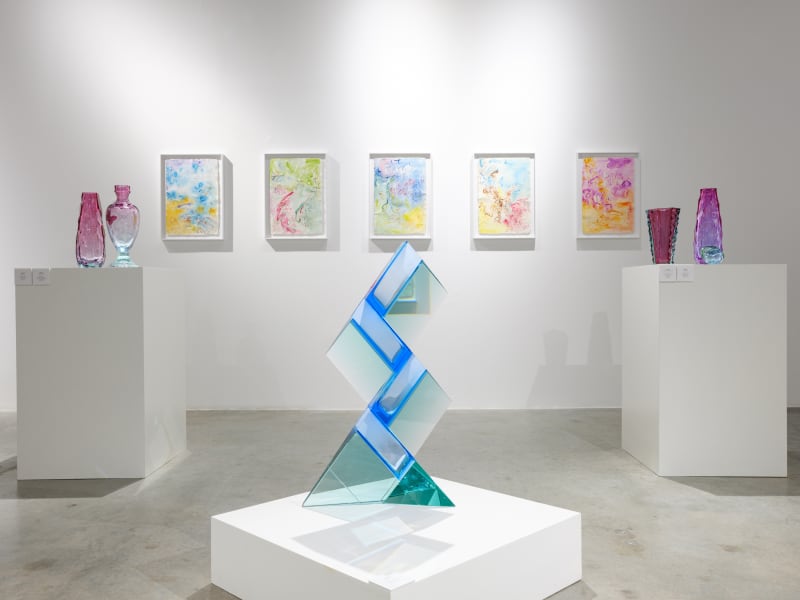Firetti Contemporary and Moser have opened the doors to their ongoing exhibition, celebrating the exquisite fusion of historic craftsmanship and contemporary art. Hosted at Firetti Contemporary, this exhibition features an exclusive selection of Moser's historical and timeless glass creations alongside newly crafted pieces inspired by the captivating artworks of Emirati artist Salmah Almansoori.
Salmah Almansoori is an Abu Dhabi-based multidisciplinary artist, born in Ghayathi, Aldhafra, in 2001. Her studio practice delves into the intersections of place and memory, resulting in a diverse body of work that spans site-specific installations, painting, sculpture, ceramics, photography, and video. A core theme in her work is the concept that a place is more than just a geographical location—it is a vortex for understanding the construction of our identities.
Almansoori believes that physical locations unintentionally absorb thoughts, emotions, and memories. For her, a sense of place can either connect us more deeply to our roots or lead us to question, challenge, or even reject our origins, culture, and identity.
The series on view in this exhibition, "I Reminisce in Colours," is a new body of work by Salmah Almansoori that explores the diverse landscapes of Ghayathi, from the expansive desert to the evolving urban environment. This series captures the essence of the city that has profoundly influenced her identity. Through watercolor, Salmah finds solace and healing, expressing her experiences and emotions through intricate mark-making and layers of color. Each stroke represents a fragment of her journey and reflects the places and spaces that hold significance in her life.
For 166 years, the products of Moser glassworks have carried the name of its founder, engraver, and businessman, Ludwig Moser. The company continues in his footsteps by evolving its traditional, handmade production. Made of high-quality unleaded crystal, Moser's works dominate both Czech and foreign markets. This achievement places Moser among the leading Czech exporters, representing the artwork of Czech glassmakers worldwide.
Blowing and hot working of glass is a team endeavor: the carry-in boy, gatherer, servitor, and gaffer work together to give the molten glass the desired form. The gatherer collects material on the blowpipe, the servitor pre-shapes it, and then passes the parison to the gaffer for final blowing. The parison is continuously shaped and worked using metal and wooden tools. Once the gaffer is satisfied with the result, the product travels to the lehr, where it cools for up to several dozen hours.
The secrets of glass cutting are traditionally passed down from generation to generation. Perfecting them requires years of practice, talent, and considerable strength, allowing the artist to work with pieces often weighing dozens of kilograms. This rare combination is beautifully reflected on the surface and facets of all Moser works of art.
Engraving demands a remarkably talented, dexterous, and meticulous craftsman. Moser engravers possess these qualities. First, the motif is transferred from tracing paper onto the glass and highlighted using a marker pen. Then the engraving begins. The master gradually removes the crystal using small grinding wheels made of various materials. The artist spends long weeks or even months working on a single engraving. But time is no object: what matters is the result and its perfection.
By showcasing Moser's timeless glass creations alongside Salmah Almansoori's evocative watercolor series, "I Reminisce in Colours," the exhibition highlights the deep connection between place, memory, and identity. Salmah's art, rooted in the landscapes of Ghayathi, and Moser's dedication to traditional glassmaking techniques both reflect a profound respect for heritage and a commitment to artistic evolution. As visitors explore this unique fusion of artistry, they are invited to appreciate the intricate processes and exceptional talents that define both Moser's legacy and Almansoori's vibrant expressions. This collaboration not only celebrates the enduring beauty of handcraft but also underscores the continuous dialogue between past and present, tradition and innovation, in the ever-evolving world of art.


